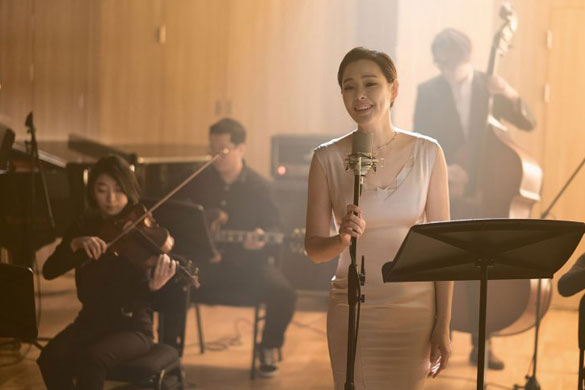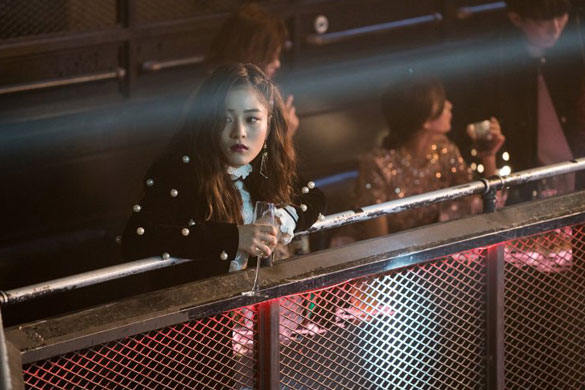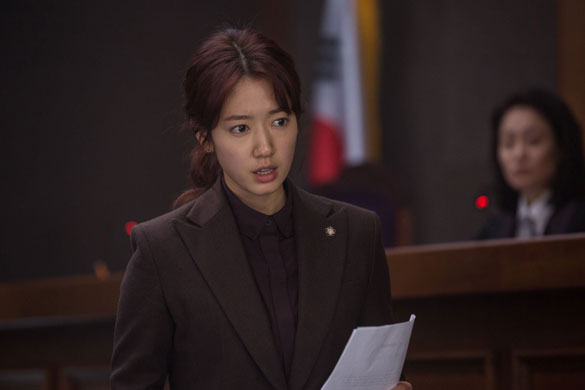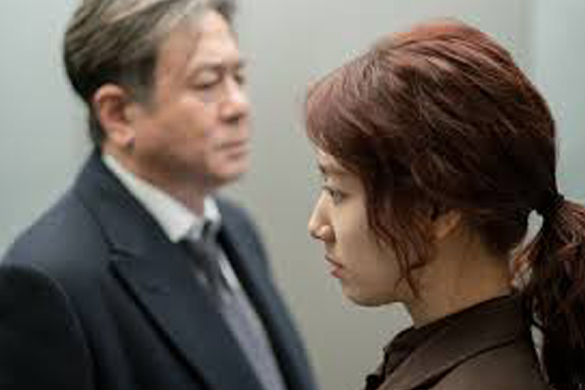
 |
||||
Im Tae-san (Choi Min-sik), president of the Taesan Group conglomerate, is in a committed relationship with popular singer Yoo-na (Lee Ha-nui; aka Honey Lee), much to the consternation of his daughter Mi-ra (Lee Soo-kyung). On attending a student reunion at a popular nightclub in Gangnam, a severely drunken Mi-ra is shown a video of Yoo-na having sexual intercourse with another man and instantly going postal she messages her father's lover demanding that they meet immediately.
Review: Heart Blackened begins with the first meeting of Mi-ra and Yoo-na at an upmarket restaurant, overseen by Tae-san. Initially polite if somewhat tense, the interaction of the two seems to be going fairly well – Yoo-na even holding Mi-ra's hand, prior to Tae-san joining them – until Yoo-na removes a book belonging to Mi-ra from her handbag; featuring pictures of Mi-ra, her mother and Tae-san from her childhood days. Instantly, Mi-ra goes on both the defensive and offensive, and in one fell swoop her animosity for the woman she will never allow to take the place of her mother begins to burn, never to be quelled. In the lead up to, and indeed during, Mi-ra’s murder trial, several of Tae-san’s actions raise questions about his motivation: Here we have a rich, powerful man vocal in his determination to clear his daughter's name, so why does he agree to employ a young, inexperienced lawyer (Choi Hee-jeong, played by Park Shin-hye) to defend Mi-ra; when Tae-san discovers an ‘assassination game’ on Mi-ra's laptop –a computer game made by her in which an avatar of Yoo-na is strangled and stabbed by an avatar of Mi-ra, is dragged onto a balcony and thrown to the ground below while the Mi-ra avatar laughs – why does he instantly instruct his subordinates to post the ‘game’ on Facebook and make it widely available online; and when the trial is at a pivotal point, why does Tae-san suddenly insist on taking time away to travel to Thailand on ‘business’? Passing spoken ‘reasons’ for each of these seeming incongruities is given at the time of their inclusion in the narrative but though they may at least be partly true as viewers will later discover they are as much excuses as anything else; the truth state of play behind each being far more deftly layered and beautifully involved than is initially apparent. In any such drama – courtroom or otherwise – where viewers piece together a complete story over time in tandem with the characters, there could of course be accusations of lying by omission, but in the case of Heart Blackened, to my mind at least, the (deliberate) feeling of disparity between action and motivation these moments bring essentially drives viewers to see them as clues to figuring out an outcome ultimately far more unpredictable than many would imagine.
Though Heart Blackened is loosely based on the 2013 Chinese film Silent Witness, the pacing of Jung Ji-woo’s Korean version is far more measured than the noticeably over-pushed, even jarring, speed of director Fei Xing’s original. I say ‘loosely based on’ because though Jung Ji-woo sticks largely to the same story ideas and plot twists of Silent Witness for a fair portion of Heart Blackened, he manages to bring enough originality to the narrative to ensure the film never feels like just a rehash. In fact, considering the themes present of love, hate, sacrifice and death, Heart Blackened could almost be considered as a modern day re-telling of a Pansori-type tale, and as such the film ultimately feels utterly Korean through and through.
The acting in Heart Blackened is accomplished throughout, with Park Shin-hye (Hee-jeong), Lee Ha-nui (Yoo-na) and Lee Soo-kyung (Mi-ra) in particular standing out as well cast in their roles. However, make no mistake, this is Choi Min-sik’s film from start to finish; his absolutely exemplary performance as Tae-san raising the film to noticeably greater heights on numerous occasions. As one of Korea’s best actors for the guts of the past 30 years, Choi can always be relied upon to raise the performance bar of virtually any film but in Heart Blackened he surpasses even himself, if such a thing is possible. Here we see a combination of hard-hitting, cold and heartless elements as seen in his recent big budget roles as gangsters and corrupt businessmen with far more, hugely nuanced emotionality that could be said to come straight from his far softer, more in-depth character portrayals in classic films such as Happy End (also directed by Jung Ji-woo), Failan and even the altogether lighter Springtime. The list of films with pitch-perfect acting from Choi Min-sik of course continues to grow year in, year out, but his performance in Heart Blackened easily stands alongside the best of the best, and that really is saying something. Ultimately, Happy End and Eungyo have already highlighted Jung Ji-woo’s talents as an exemplary and important film-maker and director. Heart Blackened underlines those talents yet further.
You can read the 2012 London Korean Film Festival Interview with director Jung Ji-woo (featuring Hangul Celluloid) at:
HEART BLACKENED (침묵) / 2017
|
||||
All images © CJ Entertainment, Yong Film Review © Paul Quinn |
||||



